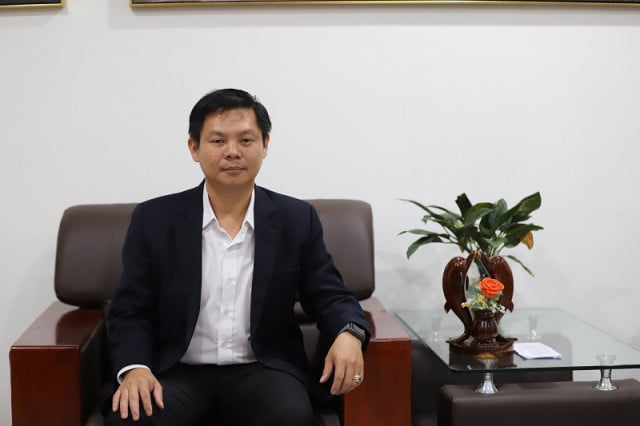Wins and Losses in Trade Pact with China

- By Song Sotheavy
- January 19, 2023 9:45 AM
PHNOM PENH -- The Cambodia-China Free Trade Agreement which entered into force in 2021 has provided benefits and potential for both countries. However, issues of standards, technical matters and raw materials have become obstacles for Cambodia.
This is the analysis of economic researcher Ky Sereyvath, director-general of the Institute of China Studies at the Royal Academy of Cambodia.
He set out his views during ThmeyThmey’s “New Idea” program.
Song Sotheavy: It has been a while since the Free Trade Agreement between Cambodia and China entered into force. What are the potentials and the deficiencies of the agreement so far?
Ky Sereyvath: The agreement, which has broadened Cambodia’s market, has been operating for more than a year. Previously, we only had markets in neighboring countries and some in Europe for agricultural products such as rice.
However, we have agricultural products other than rice that we can export to China. We are exporting rice, cashew nuts, fresh mangoes and mango jams, as well as cassava and rubber.
This has the potential for Cambodia to gain negotiating power to exchange products with other countries.
On the other hand, we can also see some parts in which the country is lacking. It is also an opportunity for Cambodia as the country —even though vegetables are in short supply — can still import vegetables and meat from China at cheaper prices.
Nevertheless, Cambodia should think about domestic products being aligned with standards and should negotiate about sanitary and phytosanitary measures with China to export other products.
Song Sotheavy: Regarding importing vegetables and meats, Cambodia also has supply chains for these as well as a lot of vacant land. Why don’t we create something for domestic farmers and investors to work on together to improve the sector?
Ky Sereyvath: If we talk about agriculture, we talk about producing many types of product. Cambodia’s agriculture sector specialises in producing rice. This is the first factor. Cambodia is the rice basket of ASEAN. Cambodia can produce rice for domestic supply and export hundreds of thousands of tonnes.
As for vegetables, the country does not grow much as we focus on rice. Vegetables are not planted if rice is more profitable. Thus, only some people living alongside rivers plant vegetables, which is still not enough for supplying due to the limited locations. Therefore, we need to import some vegetables and meat.
However, if we look at the potential that I have mentioned earlier, Cambodia being an agriculture producing country doesn’t mean that the country can export everything. The agriculture sector remains good based on specialties.
Song Sotheavy: While talking about the standard of products, who are the stakeholders to improve the sector?
Ky Sereyvath: Regarding standards that have been set, the barrier is not custom and excise as agreed in the free trade agreement. However, another important kind of barrier is the sanitary and phytosanitary measures. It means that if both countries cannot agree, it is hard for Cambodia to export.
In this sense, private sectors have nothing to do with it because it is the work of both governments to negotiate sanitary and phytosanitary conditions. Once it is done, the rest is up to the private sector and the people to learn about the limitations on chemicals and the types of product approved for export, which makes it easier for productivity.
Song Sotheavy: Then what should be done to boost the work in this sense?
Ky Sereyvath: First, the Chamber of Commerce is the connector and studies it clearly. Then the chamber and private sectors cooperate closely with the government to create a forum to support each other.
The second work is focusing on comprehensive friendship, as this is also an important part for the embassy to contribute. So, the relations between Cambodia and China which have been built for a long time and the relationship during the King Father Norodom Sihanouk’s leadership have led to a comprehensive friendship between the countries. Although it’s currently not so strong, all stakeholders must enhance the sanitary and phytosanitary measures.
Song Sotheavy: The Free Trade Agreement between Cambodia and China has just started, and we know that China has always been a big business country since the ancestors while young Cambodian entrepreneurs have only increased in the past 30 years. Does China have the upper hand? And how should Cambodia improve?
Ky Sereyvath: In agriculture, we cannot say that we are younger and that our entrepreneurs have just taken action. Previously, we lost opportunities for a while due to wars. If we look at the history, during his leadership, the King Father Norodom Sihanouk was boosting the progress of commerce until the war with the Pol Pot regime.
So, we have only rebuilt the country for the last 30 years, and the young entrepreneurs are shaped by the human resources development. At the same time, Cambodian people also have Chinese ancestry.
However, the barriers for Cambodian entrepreneurs are the unawareness of legal factors, limited raw materials processing, and importing machines as well as technology from foreign countries. These make costs high and our products cannot compete.
It does not mean that we are to compete with China which is a big country with big economy and we are a small one. We should think that Cambodia has a specialty to produce products China has difficulty producing, and vice versa. Goods with high cost are produced in China and imported to Cambodia with cheaper prices, while Cambodia produces at low cost but exports to China at high prices.
Therefore, the trade between the two will benefit both countries. Besides, there should be a cooperation with the community of small and medium enterprises with the facilitation from the government and other stakeholders.
Originally written in Khmer for ThmeyThmey, this story was translated by Meng Seavmey for Cambodianess.















